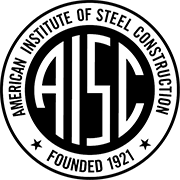Continuing Education
High-fidelity modeling of fracture-critical welded steel beam-to-column connections and their impact on earthquake stability of buildings
Welded beam-to-column connections on steel moment-resistant frames built before the 1994 Northridge earthquake degrade by fracture of the welded beam-to-column flange connection, followed by yielding and fracture of the bolted shear tab. A nonlinear fiber-section model is proposed to simulate this behavior, including explicit modeling of flange fractures and damage to the shear tab. This modeling approach captures the realistic degradation sequence of welded connections that are capable of resisting relatively high demands even after one flange fractures. The proposed fiber section simulates each welded flange with a single fiber using a newly developed damage model with a stress-based damage rule to predict fracture and crack closure under cyclic loading. The stress-based damage rule uses the steel and weld fracture toughness--measured with the Charpy-V-notch (CVN) test--and weld flaw size (a0) to estimate the low-cycle fatigue fracture capacity of each flange. The proposed fiber-section approach overcomes the limitations of conventional concentrated plastic hinge models that simulate fracture with a constant rotation limit, ignoring cyclic degradation of fracture strength, material toughness, and weld defects. The proposed modeling approach is utilized in nonlinear dynamic analyses to simulate structural system response, damage distribution, and collapse stability under earthquake ground shaking. Case studies of tall pre-Northridge steel moment frame buildings are used to evaluate the influence of connection damage on collapse safety, which has important implications on post-earthquake building inspections, reoccupancy and functional recovery.Learning Objectives:
Modeling damage progression of a pre-Northridge welded beam-to-column connection and its effect on frame stability under buildings subjected to earthquake loading.
- Date: 3/23/2022 - 3/25/2022
- PDH Credits: 0
SPEAKER(S)
Francisco A. Galvis; Gregory G. Deierlein; Wen-Yi Yen; Carlos Molina Hutt
